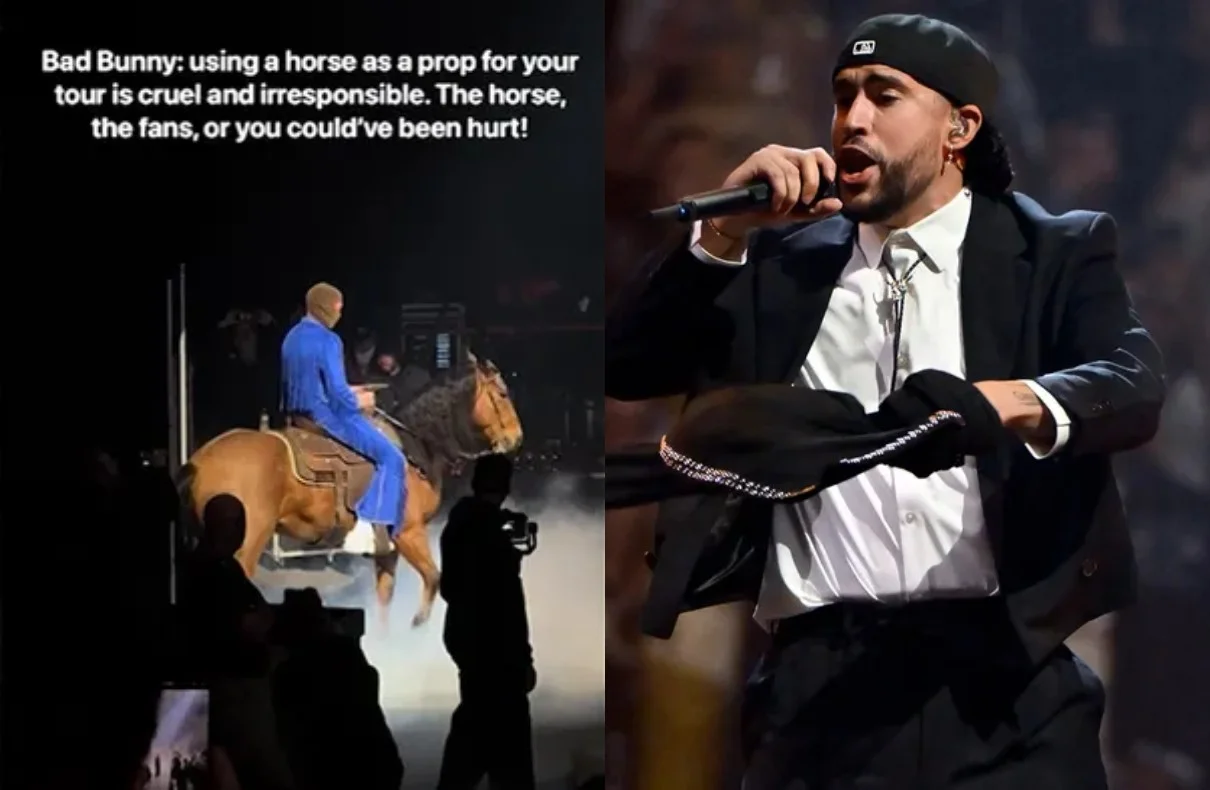
In the world of music and entertainment, artists are constantly pushing boundaries to create memorable and visually stunning performances. However, sometimes these artistic choices can spark controversy and draw criticism from various groups. One recent example of this is Latin superstar Bad Bunny, who found himself at the center of a controversy after riding a horse during a tour stop. Animal rights organization PETA (People for the Ethical Treatment of Animals) condemned this act, claiming that using a horse as a prop is cruel and irresponsible.
Bad Bunny, known for his energetic performances and unique style, kicked off his “Most Wanted” tour in Salt Lake City, Utah. During the show, the Puerto Rican rapper-singer-songwriter made a dramatic entrance riding a horse. Dressed in an all-denim outfit, he captivated the audience as he rode the chestnut-colored horse into the spotlight, with fans cheering and screaming for their favorite artist.
Kanye West’s Wife Bianca Censori: A Fashion Icon in Milan
As videos of Bad Bunny’s horse-riding performance went viral, PETA wasted no time in expressing their disapproval. Taking to their TikTok account, the organization shared the video and criticized the artist for using a horse as a prop. In white letters overlaying the video, PETA stated, “Bad Bunny: Using a horse as a prop for your tour is cruel and irresponsible. The horse, the fans, or you could’ve been hurt!”
PETA’s condemnation of Bad Bunny’s horse stunt stems from their belief that animals should not be exploited for entertainment purposes. They argue that horses are highly skittish animals and subjecting them to the loud noises and bright lights of a concert setting can cause distress and potential harm. According to PETA, using animals as props in performances is not only ethically wrong but also poses a significant risk to their well-being.
In addition to PETA’s criticism, Bad Bunny faced a wave of backlash on social media platforms. Many users expressed their outrage, labeling the act as animal abuse and condemning the artist for his insensitivity. One user on X (formerly Twitter) wrote, “This is animal abuse,” while another commented, “This is the most disgusting thing ever.” The outcry on social media further fueled the ongoing debate surrounding the use of animals in entertainment.
PETA’s condemnation of Bad Bunny’s stunt aligns with their broader mission of advocating for the ethical treatment of animals. The organization has a long history of challenging industries and individuals who exploit animals for various purposes, including entertainment. PETA believes that animals deserve to live free from cruelty and exploitation, and they actively campaign for animal rights through protests, investigations, and public awareness campaigns.
As of now, Bad Bunny has not publicly responded to the backlash and criticism he received for the horse stunt. It is important to note that artists often take risks and make creative choices to enhance their performances. While some may argue that using animals as props is unacceptable, others may view it as a form of artistic expression. Understanding the artist’s perspective and motivations behind such decisions is crucial to engage in a balanced discussion about the ethics of using animals in entertainment.
The controversy surrounding Bad Bunny’s horse stunt raises broader questions about the treatment of animals in the entertainment industry. While some argue that using animals as props can be harmful and exploitative, others believe that it can be done responsibly with proper care and consideration for the animals’ well-being. This controversy serves as a reminder to critically examine the ethical implications of our entertainment choices and to strive for a more compassionate and responsible approach.
Allen Weisselberg Former CFO of Trump Organization, Pleads Guilty to Perjury
In response to incidents like Bad Bunny’s horse stunt, the entertainment industry has implemented regulations and standards to ensure the welfare of animals involved in performances. Many countries and jurisdictions have specific guidelines and permits required for the use of animals in shows and events. These regulations aim to protect animals from harm and ensure that their well-being is prioritized. However, the effectiveness and enforcement of these regulations can vary across different regions.
As artists have a significant influence over their fans and the general public, their actions and choices can shape societal norms and values. In the case of Bad Bunny and the horse stunt, the controversy sparked a broader conversation about the treatment of animals in entertainment. Artists have the power to set positive examples by advocating for ethical treatment and responsible use of animals in their performances. Their influence can contribute to raising awareness and driving change within the industry.
